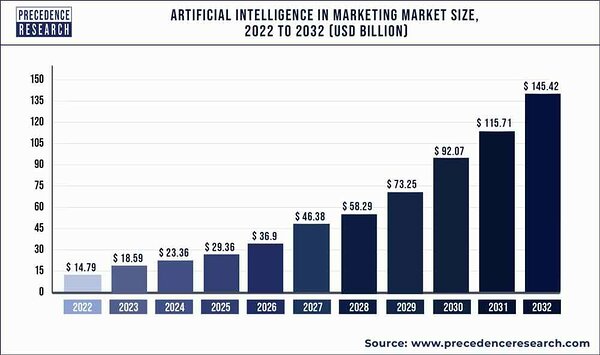Key Takeaways:
- In 2024 and beyond, AI search engines and visual AI site search tools will greatly improve user experience and shorten the customer journey.
- They’ll perfect user intent understanding.
- Voice and visual search functionalities will become imperative in companies worldwide – especially within AI-based search in e-commerce.
- Customers will prefer only the platforms that integrate AI search engine tools.
As we race through the 3rd decade of this exciting 21st century, the digital world wants quick yet accurate information. Companies like Google, Bing, and OpenAI are leading the way, creating AI search engines and other AI-powered search tools that are helping us find exactly what we want as quickly and effortlessly as possible.
This guide dives deep into these cutting-edge technologies, showing how AI boosts search systems and redefines how we discover data, content, services, and products online. We’ll explore the key principles behind these systems, how they jazz up digital platforms, and what they mean for:
- The future of site search
- Content and product discovery
- Improving customer journey
- Search relevance
- Improving search intent
- Smart merchandising
- Personalization
If you’re a pro looking to understand how AI shapes modern search and how to use it to boost your business, this guide is a must-have for mastering intelligent search, smart merchandising, and improving conversions through AI-powered search tools.
Introduction to AI-Powered Search and AI Search Engine Tech
By now, it is clear that future money lies in AI tech.
The global worth of AI in marketing was valued at $18.59 Billion in 2023, and it is projected to hit over $145.5 billion by 2032, with a growth of 26% CAGR.

But where’s the biggest potential of AI within modern businesses?According to Statista, here’s a list of the most popular uses of AI-related products and tools from 2023:
As you can see, the potential of AI-based online search and product discovery is vast.
Using machine learning and natural language processing systems such as ChatGPT speeds up search and improves personalization in a way traditional search technologies simply can’t match.
AI is changing the search game for businesses like yours. It brings many perks and benefits that are shaping the way consumers discover content, services, and products on the web.
And the best part?
Your business can use this tech to skyrocket sales.
What is AI-based Search?
Search engine AI tech is all about using intelligent search systems to make finding what you need online quicker and easier.
Advanced search platforms, such as Bing, Bard, and ChatGPT, use machine learning to understand better what users are looking for, giving them more relevant and personalized search results.
An AI search engine goes well beyond just matching keywords.
This tech focuses on understanding why a user is searching for something. As users interact with these AI-powered search engines, the system learns from their actions, fine-tunes search results, and delivers exactly what the user wants.
Benefits of AI-Powered Search
Perhaps the best thing about AI in online search and marketing is that it equally benefits both sides – the businesses that use it AND their customers.
Benefits from the users’ standpoint:
Delivering highly relevant results tailored to the individual user’s intent and context.
Seamless and intuitive search and accurate product discovery in e-commerce platforms.
Improved personalization, even without cookies, as product tagging and search filters become smarter and enable dynamic product recommendations.
TikTok-like shopping experience thanks to visual AI search tools that allow users to perform wordless search and find what they want through a couple of clicks or taps on the images, revolutionizing how we shop online.Benefits from a business-owner standpoint:
Improved sales and conversions
Cost optimization
Better customer retention
Actionable insights and analytics of customer behavior and trends
Long-term competitive advantage for early adopters
How AI is Transforming Traditional Search
Artificial intelligence is revolutionizing site search and product discovery by enhancing the accuracy and efficiency of traditional search engines.
In ecommerce search, for example, AI for ecommerce has become a cornerstone for driving user engagement and conversion rates.
Generative AI and AI visual tools can now interpret complex queries, enabling features such as automatic product tag generation and intelligent ecommerce filters. These AI-driven capabilities ensure that users receive tailored content quickly, improving the overall search experience.
And what’s perhaps most exciting is that AI tech will only improve and mature, and so will its role and value in online search, setting a new standard for how search engines understand, process, and deliver information.
Machine Learning and Search AlgorithmsMachine learning algorithms are at the heart of modern AI-powered search engines. They are transforming search query processing and improving the delivery of relevant results.
The perfect example is ecommerce site search, where AI tools utilize search box data to enhance the accuracy of product tags, allowing the shopper to quickly find that one perfect dress within the sea of similar dresses available on that platform.
Machine learning and extensive datasets play together to make recommendations more responsive and predictive, anticipating user needs with remarkable precision.
It’s almost like mind-reading.
As a result, businesses can offer a more personalized shopping journey, increasing customer satisfaction and loyalty.
AI-Powered User Experience
User experience is critical for business success. Here’s a graph showing just how vital it is:
With the power of AI-driven technologies, businesses can easily boost user experience by tailoring search engine results to individual preferences and behaviors.
Google and other search platforms use AI-powered site search tools to improve personalization and bring the most relevant content to their users, utilizing product tags and user data that refine search outcomes.
Generative AI tech, including large language models, has skyrocketed the precision and speed of getting relevant search results. This user-centric approach is the only way to improve customer journeys, enhance UX, boost consumer loyalty, and – ultimately – stay ahead of direct competition.
Enhancing Search Results with AI
Traditional text-based search delivers solid results – but is slow and not personalized.
Search engine AI and AI-powered search tools enhance search results by fine-tuning algorithms so the results are personalized and cater to individual user queries and behaviors.
Imagine a fashion store where each and every clothing item matches your taste and style.
Machine learning within these sophisticated engines is continuously improving search algorithms. This maximizes search relevance and delivers highly personalized search results by analyzing vast amounts of data, including product tags and user engagement metrics.
AI is excellent at interpreting and responding to complex queries through natural language processing, acting like a human who understands your intent almost perfectly.
Visual AI Search Engines in Action
Google’s AI-enhanced search capabilities are a leading example of search engine AI tech that is transforming how website visitors interact with the content and products they seek.
AI-based search, visual search and reverse image search are redefining search functionality, allowing for an intuitive and image-driven approach to content, product, and information discovery.
In e-commerce, AI-powered site search tools have become the top priority for those who want to stay relevant among their competitors. These tools offer a simple and customer-centric shopping experience that can:
Drive conversions
Increase customer loyalty
This is why visual search is the present and the future of online retail.
The impact of AI in visual search technologies is huge, and these tools are now disrupting the e-commerce industry. They are already solving e-commerce problems that businesses don’t even know about.
Integrating visual search and image-based queries is now as important as the mobile-first approach was a while ago.
Why?
Because it does the following:
- Minimizes the need for flawed text-based search input.
- Reduces the need for boring metadata and the use of cookies.
- Enables customers to find what they want in seconds.
- Minimizes the need for complex filtering.
How Do Visual AI Search and Product Discovery Work?
Visual AI-driven search tools empower consumers to locate products by tapping on product images they like. The AI then reads what’s in the image and delivers a whole wall of similar products. Here’s a perfect example of this type of tool in action:
You’ll agree that this is a far more intuitive and efficient search process that significantly improves the consumer journey and helps e-commerce platforms sell more products.
It can also help with product recommendation sections, which are essential devices in increasing cart value and boosting sales:
Easily Integrate AI Search Engine Tools With Miros
If you like the demo videos above and recognize the value of visual AI search tools for your business, then using Miros.ai for your platform is a must.
Miros.ai can help your shoppers find exactly the product they need in just 60 seconds AND will make them browse your platform for at least 60 minutes more. Imagine a shopping experience as addictive and engaging as using TikTok or Pinterest.
It works for various industries and niches, including:
Miros will enable your shoppers to get just the product(s) they seek in seconds, without website cookies or the annoying use of metadata.
It is based on visual-based semantic search, as words and text-based inputs are bad at describing products, designs, styles, and aesthetics.
Everybody uses different words to describe a particular product, which is why images are much more efficient at helping consumers find the products they have in mind.
The Impact of Miros in Numbers
Miros’ clients quickly saw improvements in KPIs and revenues, including:
A 4.7% boost in conversion rate, 8% better AOV, and 10% higher GMV – read the full case study here.
A 19% rise in GMV, 11% higher AOV, and 10% higher ARPU – read the case study here.A 7% boost in customer retention + 7% better GMV – case study available here.
Want your e-commerce business to experience similar KPI boosts?
Let us show you firsthand how your shoppers can find exactly what they’re looking for in seconds.
The Future of AI Search
As we look to the horizon of search in AI technology and AI-powered site search tools, the emergence of advanced engines like GPT-4 marks a significant milestone in the evolution of search capabilities, enabling more intuitive and faster interactions.
The future of shopping, information search, and content curation can now be seen, and it looks fantastic.
GPT-4 and the Evolution of Search
Developed by OpenAI, GPT-4 is at the forefront of conversational AI, going beyond the traditional, text-based search interface that relies only on keywords. This new and even more advanced tech will bring the next-level web search and marketing era where AI-powered search engines will fully understand human intent and needs.
It precisely interprets customer intent, enabling deeper engagement across the digital landscape.
With AI-powered engines, the search experience becomes less about entering keywords and more about engaging in a dialogue or visual interaction, with search tools understanding and anticipating user needs perfectly.
Such advancements in AI are setting a new standard for user engagement, where every interaction is an opportunity for enrichment, efficiency, and personalization, completely and deeply changing how users interact with digital platforms.
Frequently Asked Questions
How Do AI-Powered Search Engines Handle User Privacy Concerns When Personalizing Search Results?
AI-powered search engines address user privacy by implementing robust data protection protocols, keeping personal information anonymous, and providing users with control over their privacy settings to ensure a secure and customized search experience.
Can AI-Powered Search Engines Interpret and Handle Multi-Lingual Queries Effectively, and if So, How?
AI-powered search engines are great at handling multi-lingual queries through advanced natural language processing techniques, enabling them to understand and process information across diverse languages efficiently and accurately.
What Are the Ethical Implications of AI in Search Engines Influencing User Behavior and Decision-Making?
The ethical implications of AI in search engines are significant, as they can subtly shape user behavior and decisions by prioritizing certain information, potentially creating biases and influencing public opinion and consumption patterns.
In What Ways Can Small Businesses Leverage AI-Powered Site Search Tools to Compete With Larger Corporations in Online Visibility and User Engagement?
Small businesses can utilize AI-powered site search tools to enhance user experience with personalized results, improve search relevance, and gain insights from search analytics, leveling the playing field with larger corporations in digital spaces.




